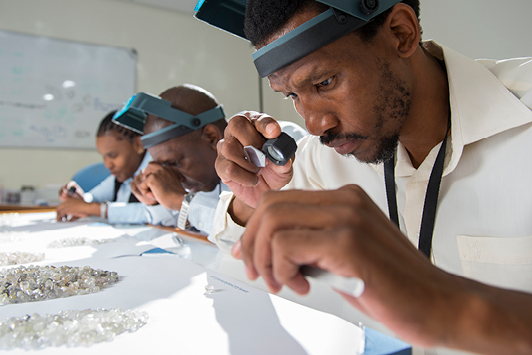 Getting the right rough to meet polished demand is a challenge. A Canadian cutting firm created the Clara platform to tackle it.
Getting the right rough to meet polished demand is a challenge. A Canadian cutting firm created the Clara platform to tackle it.
Matching supply with demand is difficult at the best of times. It’s harder when the product in question is as heterogeneous as diamonds. And it’s trickier still in an industry with a reputation for being slow to adopt technology.
These were the challenges that Aaron Ariel and Ophir Stolov, executive directors at Canadian diamond manufacturer HRA Group, faced when they sought a fix for one of the sector’s biggest problems. That path led HRA to found Clara Diamond Solutions, a platform that Lucara Diamond Corp. ultimately purchased for around CAD 29 million ($23 million).
At first sight
Ariel and Stolov, who had backgrounds in engineering, saw that the trade’s approach to rough buying was inefficient. This was most apparent in the sight system, under which contract clients buy boxes of raw material in bulk deals and end up with large volumes of goods they don’t want. HRA experienced this outcome often, recount the directors, since their company focuses on proprietary cuts and therefore has highly specific rough needs.
Arranging stones into assortments of similar goods is an elegant way of commoditizing a product that has relatively low fungibility, explains Ariel; diamonds are too diverse in value to sell in bulk otherwise. But this solution means the purchaser inevitably receives a combination of low-value stones, stones that will yield high-value polished, and stones it can barely use.
“You get a [polished] order, [and] you go and buy millions of dollars of goods, [only] for a fraction of those goods to actually be appropriate for your order,” says Ariel, whose father founded HRA in the 1980s. “The rest is either manufactured inefficiently or distributed as rough inefficiently. There’s so much overhead.”
Enter Lucara
Around 2015, Ariel and Stolov began developing a system that would let manufacturers put in orders based on their desired polished outcomes, state the price they were willing to pay, and receive a suitable rough supply. The rough seller would upload the goods alongside a scan from a Sarine Technologies mapping device, and an algorithm would match them to the polished.
HRA decided that the technology would get broader acceptance under the stewardship of a mainstream rough producer, as the process requires participants to submit a vast amount of business information. “The number-one challenge when we were launching was, ‘How do you get the manufacturers to trust you with their data?’” says Stolov. “And it’s a really tough sell from another manufacturer.”
So HRA sold 100% of its Clara system to Lucara in 2018. Lucara has a good relationship with the diamond market, making customers feel comfortable enough to sign up, Stolov explains. He and Ariel have stayed on at Clara as strategic consultants.
As of September 30, 2021, the platform had 87 buyers and a small number of third-party sellers — chiefly manufacturers — wishing to trade rough they’d bought, according to Lucara CEO Eira Thomas. The value of transactions through Clara more than doubled to $6.6 million in the third quarter of 2021, up from $2.8 million a year earlier, Lucara said in its latest earnings report.
One of a kind?
As far as Ariel and Stolov know, Clara is the only available service that matches rough supply with polished demand. The company applied to patent the invention in 2018; Israel recently became the first country to grant it protection, and the duo expects other countries to follow suit. This begs the question of why no one else has created something similar.
Both De Beers and Alrosa — which use the sight system — give customers digital images of rough stones, and recently introduced new supply contracts that tailor their goods more precisely to three types of clients: manufacturers, dealers and retailers.
De Beers also has an expanding artificial intelligence (AI) program that tracks demand trends and helps optimize rough sales, says a spokesperson for De Beers Ignite, the company’s strategy and innovation unit. “Demand for these types of services is already evident and, we believe, will only continue to grow as the potential value they add becomes better understood.”
For now, however, Clara appears to have the market to itself.
Image: Lucara employees sort diamonds at the Karowe mine in Botswana. (Lucara Diamond Corp.)Article from the Rapaport Magazine - January 2022. To subscribe click here.